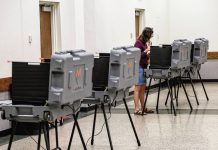A Wisconsin-based advocacy organization has asked the Flatrock-Hawcreek School Corp. to stop including prayer during school-sponsored events.
A complaint filed on behalf of a local parent by the Freedom From Religion Foundation focused on three events in Hope area schools. They were cited in a June 2 letter written by foundation attorney Ryan D. Jayne that was sent to school district Superintendent Shawn Price.
The child of the complainant witnessed a senior faculty advisor asking three student speakers for last spring’s Hauser High School commencement whether one would deliver a prayer, Jayne stated in his letter.
“It seemed to be expected that one of them would,” Jayne said in a recent telephone interview.
The foundation claims the high school reviewed and approved the prayer that was delivered during the graduation ceremony.
A short time earlier, then-Hauser Principal J.P. Mayer introduced adult representatives of the Chapel of the Good Shepherd, a church on County Road 700N southwest of Hope, to students during commencement practice, the letter stated.
Those representatives were allowed to distribute papers with Bible verses to students, along with a gift card to a fast-food restaurant, the letter stated.
Citing a 1992 U.S. Supreme Court decision, Jayne stated school officials may not invite a student, teacher, faculty member or clergy to give any type of prayer, invocation or benediction at a school-sponsored event.
Another example cited in the foundation’s letter was last spring’s Hauser Academic Excellence Banquet. The program listed a scheduled invocation, which witnesses said ended with the words “in Jesus’ name,” Jayne’s letter stated.
When those words were used, it made the invocation “a Christian event,” he said.
The third concern expressed in the letter was an annual national observance conducted during September called See You at the Pole, where students gather around flagpoles to join in prayer.
Although Jayne’s organization does not object when prayer events are initiated and led exclusively by students, reports were received that school staff participated in See You at the Pole, as well as allowed prayers during athletics games, the letter stated.
Price said the foundation’s objections are the first of its nature he has received.
Schools have a duty to remain neutral toward religion, Jayne wrote. If they don’t, they “alienate the 35 percent of young Americans who are not religious,” he wrote.
After asking twice for specific written steps the district planned to take to address its concerns, the foundation said it received a letter from school district attorney Scott Andrews dated Aug. 31.
It said the corporation has taken all appropriate and reasonable steps to make sure the school is in compliance with the constitutional principles of separation between church and state.
“While we disagree with much of the factual allegations raised in your letters, please be assured that the school takes the allegations raised seriously, and such matters have been discussed accordingly,” Andrews wrote.
Jayne said he’s willing to take the school district at its word.
However, “if our local complainant reports the practice hasn’t changed, we will continue to follow up and consider further legal action,” the foundation attorney said.
Founded in 1830 by Moravians who had come from North Carolina, the town of Hope still has many residents of different Christian denominations who maintain strong religious beliefs, Hope Town Council President Clyde Compton said.
Regarding the concerns expressed by members of the Wisconsin-based foundation, Compton suggested that they mind their own business.
“The worst thing you can do is to take prayer out of school,” the council president said. “If you look back on history, you find that when religion is removed, that’s when our youth find it much, much harder to become a well-rounded person.”
But the foundation said the courts have continually reaffirmed that the rights of minorities are protected by the Constitution, Jayne wrote.
“It makes no difference how many students want prayer or wouldn’t be offended by prayer at their school events,” Jayne wrote in his letter. “As the Supreme Court has said, fundamental rights may not be submitted to vote.”
Founded in 1978, the Freedom From Religion Foundation was created to promote the constitutional principle of separation of state and church, and to educate the public on matters relating to nontheism, according to its website.
Of the foundation’s 29,000 members, more than 400 reside in Indiana, Jayne said.




